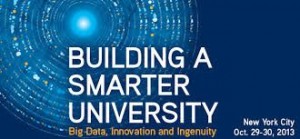You are what you byte: Modern society’s data diet

The rise of digital technology has produced an increasingly data driven society. A 2013 report by SINTEF concluded that 90 percent of the world’s total data had been generated in the previous two years.
Education is no exception to the widespread trend of utilizing data. Jim Macklin, director of Planning and Research at Hudson Valley, said, “The amount of data we have available to us has grown exponentially.”
Hudson Valley collects and analyzes data for financial purposes, academic effectiveness, administrative effectiveness and planning for future enrollment. Each year the college sends data to the New York State government to verify funding needs. Every school in the country sends information to the US Department of Education so that the education system can be assessed.
Michael Green, vice president of Institutional Effectiveness, described the philosophy of data sharing between governments and the college.
“You’re being paid for by public funds. We want to make sure our funds are being spent well,” said Green.
In addition to using data for billing and funding, HVCC also uses a data driven system to continually assess academic programs.
“A course is developed, you then assess to see how it’s doing, based on those results you change, then assess again,” said Green.
“It’s a cycle of continuous improvement,” said Macklin.
Along with the academic side, the administration is also regularly evaluated. Dennis Kennedy, director of Communications and Marketing, said, “Every professional office on campus goes through the assessment process as well. It’s data driven.”
Hudson Valley measures its success with metrics such as graduation rates, transfer rates and employment after graduation. The school keeps track of students that transfer and any future degrees that are attained.
A new data program in the New York State public education system has caused backlash recently. It would involve a private organization, inBloom, storing data on all students in K-12 for the state.
Big data has caused many privacy concerns outside of education as well. Private companies like Google and Facebook can build a detailed profile of their users. Phones can track location. The NSA’s data collection programs have been under fire in the past year. America is in the beginning stages of a national discussion on the implications of big data.
However, Hudson Valley’s data programs are not intrusive.
“For the most part we deal in aggregate data. We’re not normally getting down to the specific individual,” said Green.
“The data we keep is very secure,” said Macklin.
Hudson Valley does not sell or share data with anyone outside of the required government entities. Personal information is all protected by federal law (FERPA).
